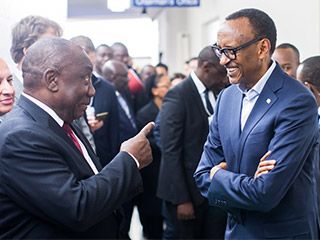Course Description
This course considers how, despite its immense diversity, Africa continues to hold purchase as both a geographical entity and meaningful knowledge category. It examines the relationship between articulations of “Africa” and projects like European imperialism, developments in the biological sciences, African …
This course considers how, despite its immense diversity, Africa continues to hold purchase as both a geographical entity and meaningful knowledge category. It examines the relationship between articulations of “Africa” and projects like European imperialism, developments in the biological sciences, African de-colonization and state-building, and the imagining of the planet’s future. Readings in anthropology and history are organized around five themes: space and place, race, representation, self-determination, and time.
Course Info
Learning Resource Types
assignment
Written Assignments

Cyril Ramaphosa, the President of the Republic of South Africa, talks with Paul Kagame, the President of Rwanda, at the Annual Meeting of the World Economic Forum in 2019. (Image courtesy of World Economic Forum on Flickr. License CC BY-NC-SA.)










